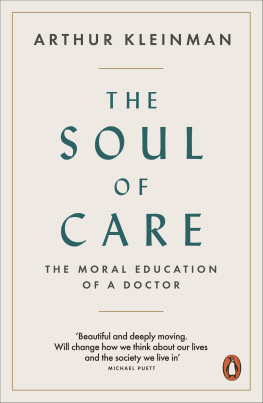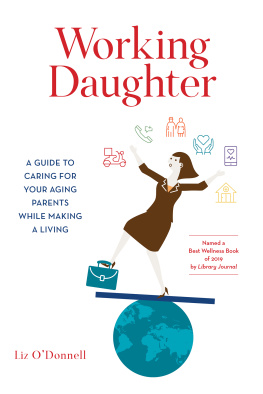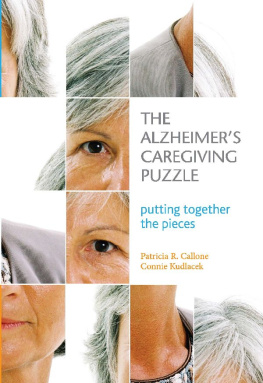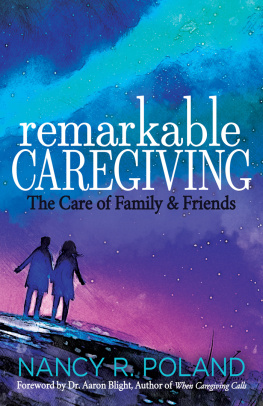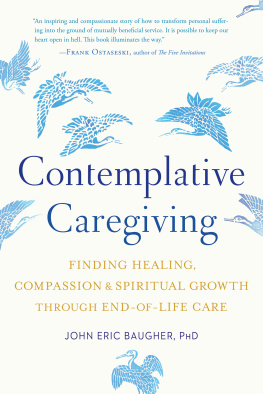Worlds of Care
CALIFORNIA SERIES IN PUBLIC ANTHROPOLOGY
The California Series in Public Anthropology emphasizes the anthropologists role as an engaged intellectual. It continues anthropologys commitment to being an ethnographic witness, to describing, in human terms, how life is lived beyond the borders of many readers experiences. But it also adds a commitment, through ethnography, to reframing the terms of public debatetransforming received, accepted understandings of social issues with new insights, new framings.
Series Editor: Ieva Jusionyte (Harvard University)
Founding Editor: Robert Borofsky (Hawaii Pacific University)
Advisory Board: Catherine Besteman (Colby College), Philippe Bourgois (UCLA), Jason De Len (UCLA), Paul Farmer (Partners In Health), Laurence Ralph (Princeton University), and Nancy Scheper-Hughes (UC Berkeley)
Worlds of Care
THE EMOTIONAL LIVES OF FATHERS CARING FOR CHILDREN WITH DISABILITIES
Aaron J. Jackson

UNIVERSITY OF CALIFORNIA PRESS
University of California Press
Oakland, California
2021 by Aaron J. Jackson
Library of Congress Cataloging-in-Publication Data
Names: Jackson, Aaron J., 1981 author.
Title: Worlds of care : the emotional lives of fathers caring for children with disabilities / Aaron J. Jackson.
Other titles: California series in public anthropology.
Identifiers: LCCN 2020037019 (print) | LCCN 2020037020 (ebook) | ISBN 9780520379855 (cloth) | ISBN 9780520976955 (ebook)
Subjects: LCSH : Fathers of children with disabilities.
Classification: LCC HQ 759.913 . J 35 2021 (print) | LCC HQ 759.913 (ebook) | DDC 649/.151dc23
LC record available at https://lccn.loc.gov/2020037019
LC ebook record available at https://lccn.loc.gov/2020037020
Manufactured in the United States of America
29 28 27 26 25 24 23 22 21 20
10 9 8 7 6 5 4 3 2 1
For Takoda
Contents
Interlude
Interlude
Acknowledgments
I owe much to the fathers and families who invited me into their lives and generously trusted me with their stories. I have been profoundly touched by their wisdom and generosity.
I want to thank Professor Tamara Kohn of Melbourne Universitys anthropology department, for going above and beyond the call of duty to support me through graduate school, for helping me strengthen my writing, and most importantly, for your friendship. I thank Professor Andrew Dawson, who inspired and encouraged me early on to keep writing. I want to thank the reviewers of this book for offering their suggestions and encouragement, including Professor Greg Downey of Macquarie University for his careful and detailed comments and Professor Maurice Hamington of Portland State University, whose enthusiasm with respect to the project touched me and whose work has immeasurably shaped my own.
I would also like to thank Professor Bob Simpson and Professor Tom Shakespeare for their helpful comments on an earlier iteration of this work.
A special thank you to Acquisitions Editor Kate Marshal and Enrique Ochoa-Kaup at the University of California Press for their early support and for shepherding my book through the approval and production process.
Love to Takodas maternal grandparents, Nan and Poppy, for always cherishing his uniqueness.
I want to thank my mom for encouraging me to follow my own path.
Thanks to my younger sister for her openness, love, and humor.
There is no person in the world whom I owe more to than my partner, Kimberley Jamieson, whose care and labor have made this book possible. She was there for all the triumphs, pain, sorrow, and challenges that were part of this project from its inception until its final iteration as a book. I have no greater respect for any person on this earth. Her intellectual curiosity, fortitude, compassion, and care constantly remind me that we contain multitudes. Kimmy, I couldnt have done any of this as elegantly if you werent by my side. I want to thank India and Winter, my daughters, for putting up with me during all the hours I have been caught up in my own world and showing me every day how easy it is to love. Finally, this book is for Takoda, my greatest teacher of all. You taught me to think and act differently. You taught me the meaning of care and how to live.
1
The Practice of Care
I was anxious meeting Pearl for the first time. I didnt want to say the wrong thing. Paul had already mentioned to me on a number of occasions that he finds it disconcerting when people ask Pearl questions shes not capable of answering. What if she can understand the question, he said. Dont you think its cruel to ask her something when she has no way of communicating a response? I had simply never thought about it before. For me, this style of communication is habit. Like Pearl, my son, Takoda, is nonverbal, and I suspect he has very limited receptive languagebut theres no real way of telling. I often ask him questions as a matter of routine: How was kindergarten, Takky? Did you have a good day? My questioning is stitched into the rhythm of our interactions. I think my utterances, intonation, and pacing have meaning for him. But I absolutely understood Pauls point, which made me worry I was going to botch things up with Pearl. In the car on the way to his place I must have rehearsed in my mind at least a dozen times what I was going to say to her, making sure there were no questions.
With a polite smile I stepped into the cramped living room of their single-family home, where Pearl sat in her wheelchair. She was firmly striking the keys of a toy musical keyboard atop her wheelchair tray.
Hi, Pearl. Im Aaron, I said, and knelt down beside her. Im going to stay here with you and your dad for a bit while I do some research. Hes told me so much about you.
With her head lowered and bent to one side, she glanced at me side-ways with a smile that raised her cheeks, exposing big white teeth, which had the immediate effect of making me feel more relaxed. Foolishly, I thought Id compose a short tune on her keyboard as a kind of bonding exercise. She shot me a sharply critical glance. So, with resigned humility, I settled for spectator status.
Lying awake in bed that night, I recognized my life in Pearls fussing and yelling, which filled the house and filtered into my bedroom, breaking the dead silence, and in the sound of Pauls pacing footsteps outside my bedroom door as he opened and closed cupboards and rattled drawers. Anxiety around Takodas disability cropped up in the furrows of my mind. I thought of how very little I had brought with me from my previous life to equip me for this one, as his caregiver. Although he was only four, sufficient uncertainty and distress had already been occasioned for me to know that I was living a life that felt deeply out of sync with the life I had lived and the lives of those around me. Pearl was twenty-two years old, eighteen years older than Takoda, and yet for Paul there seemed to be no end to the confusion, distress, and noise associated with his life as her caregiver. The truth is, I had been feeling badly about what I perceived to be my inadequacies as a father for some time. I was living with a gnawing uncertainty in what felt like a deeply ambiguous and ungrounded world. Finally, the house fell silent again.


